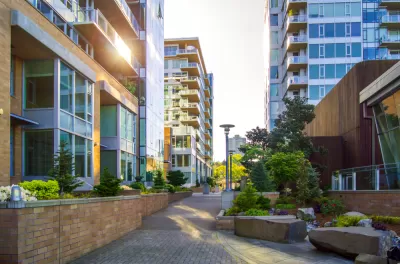The political will for zoning reforms has never been stronger. The traditional opponents of development, however, are still finding ways to push back.

Writing for the Lincoln Institute of Land Policy, Anthony Flint provides a detailed overview of zoning reform around the country, “from Connecticut to California,” with examples of the back-and-forth power play between local and state governments that is either enabling, or preventing, ongoing efforts to undo some of the strict requirements of 20th century zoning.
The article surveys many of the numerous jurisdictions that implemented zoning reforms in recent months, describing the issue as remarkably bipartisan. Flint credits the growing shortage of affordable housing in cities and communities all over the country for the new political will for reforms, but notes that there have also been setbacks.
“Responding to those who oppose any change in local regulations for development, state lawmakers have watered down statewide reform efforts by adding opt-outs or removing penalties for noncompliance,” including, according to Flint, in Utah and Massachusetts.
With these challenges in mind, Flint also offers advice for how to overcome traditional obstacles and build consensus for change:
States intent on reform must convince localities that changing zoning in targeted ways is achievable and will be beneficial. Technical assistance and education, facilitated by state agencies and nonprofit organizations, will help, said Massachusetts-based researcher Amy Dain, who has conducted research for the Lincoln Institute and has documented how suburban communities around Boston have erected a “paper wall” of bureaucracy that hobbles attempts by developers to build multifamily housing.
The article’s discussion of contemporary zoning also includes a history lesson, by mentioning the 1923 Standard State Zoning Enabling Act, which turns 100 this year, as the root of the power granted local governments in zoning. Flint suggests that statewide efforts are most effective to counteract local control.
The rationale for statewide standards, however, has become increasingly clear: to eliminate the patchwork of different policies and regulations within metropolitan regions. Some communities might allow ADUs, for example, while others prohibit them. A more uniform regulatory regime would level the playing field, reflecting actual homebuying and renting aspirations and making it possible to develop a responsive regional approach to issues like the current affordability crisis.
A lot more detail on the where, how, and why of zoning reform is available at the source article below.
FULL STORY: The State of Local Zoning: Reforming a Century-Old Approach to Land Use

Maui's Vacation Rental Debate Turns Ugly
Verbal attacks, misinformation campaigns and fistfights plague a high-stakes debate to convert thousands of vacation rentals into long-term housing.

Planetizen Federal Action Tracker
A weekly monitor of how Trump’s orders and actions are impacting planners and planning in America.

In Urban Planning, AI Prompting Could be the New Design Thinking
Creativity has long been key to great urban design. What if we see AI as our new creative partner?

How Trump's HUD Budget Proposal Would Harm Homelessness Response
Experts say the change to the HUD budget would make it more difficult to identify people who are homeless and connect them with services, and to prevent homelessness.

The Vast Potential of the Right-of-Way
One writer argues that the space between two building faces is the most important element of the built environment.

Florida Seniors Face Rising Homelessness Risk
High housing costs are pushing more seniors, many of them on a fixed income, into homelessness.
Urban Design for Planners 1: Software Tools
This six-course series explores essential urban design concepts using open source software and equips planners with the tools they need to participate fully in the urban design process.
Planning for Universal Design
Learn the tools for implementing Universal Design in planning regulations.
Gallatin County Department of Planning & Community Development
Heyer Gruel & Associates PA
JM Goldson LLC
City of Camden Redevelopment Agency
City of Astoria
Transportation Research & Education Center (TREC) at Portland State University
Jefferson Parish Government
Camden Redevelopment Agency
City of Claremont





























